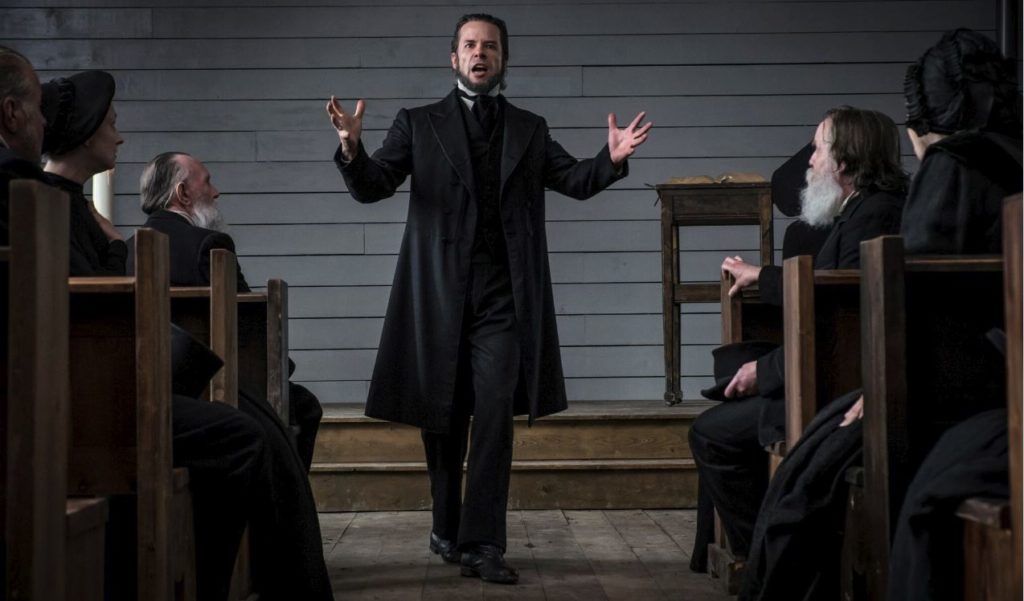
Dakota Fanning co-stars in the violent revenge western.
Guy Pearce was on the line — but, truth to tell, we were a little afraid to pick up the phone. Well, OK, maybe more than a little.
Please don’t misunderstand: It’s not that Pearce — the English-born, Australian-reared star of L.A. Confidential, Memento, Iron Man 3, Ravenous and The Proposition — has some sort of fearsome reputation as a ranting-and-roaring rageaholic. It’s just that, at the time he called, we’d just seen him in Brimstone, a violent western drama of revenge set to open Friday, March 10, in limited theatrical release and on digital platforms. And in the film, directed by Dutch filmmaker Martin Koolhoven, Pearce is ferociously convincing as a character known only as Reverend, a fanatical clergyman who, for reasons only gradually explained, is dead-set on making life a living hell for Liz (Dakota Fanning), a young midwife in the 19th-century American frontier.
Just how scary is Reverend? Put it this way: When Brimstone was screened at the Toronto Film Festival last September, a capsule description in the festival program referred to the character as “an emissary of evil.” And even that struck us as an understatement.
Fortunately, Pearce turned out to be a thoroughly ingratiating fellow, quick to laugh — not like a maniacal movie villain, mind you, but like a regular dude — and eager to make the most of our short interview time. Here are a few highlights of our conversation:
Cowboys & Indians: Brimstone isn’t your first rodeo. You’ve previously appeared in some period westerns, like Ravenous and The Proposition, and some that might be described as modern-day westerns, like The Rover and Lawless. Are you drawn to the genre?
Pearce: Actually, I have a pretty broad taste in the films that I like. Also, I’m aware that I’m limited as an actor, and there’s only so much that I can do. But it’s not just about the limitations — it’s also about what I find interesting on the page, and what I feel I’m able to do. When something comes along where there are dire straits involved, or somebody’s facing adversity and it’s a life and death situation, I think the way in which that’s realized on the page can be incredibly compelling.
Sometimes you can read things and go meh, I’ve seen this before, or I don’t really believe it. But I’m just as likely to choose something like Ravenous or Brimstone as I am to choose L.A. Confidential or Memento, because they’re all life-threatening situations. They’re all psychological stories in a way. It’s just that two of them happen to be set in the streets of Los Angeles, and the other two happen to be set out in the country, or the desert. For me, it’s about the psychology of the story, I think, more so than anything else.
C&I: Did it help to have a Dutch director on hand to coach you while you attempted a Dutch accent?
Pearce: [Laughs.] Of course, yes. I did have Martin occasionally tell me that I sounded Scottish on one day, or I sounded Swedish on another day. So he was very upfront about keeping me on track with my accent. He did also say that it’s a very difficult accent to do, and he was right about that. It is a very difficult accent to do.
C&I: What was the toughest thing about playing Reverend? What aspect of your character was most challenging to portray?
Pearce: Well, I think the accent, to be honest. I feel like I can never really find the character until I can find their voice. That voice sometimes involves accents, sometimes it’s just about the pace that a character speaks. Sometimes it’s sort of the register that they’re in, and usually it’s a combination of all of those things. The accent was, as I say, very difficult.
It was pretty clear to me who the character was when I first read the script. And I think one of the pivotal things to get across with the character was to actually make him three-dimensional. He’s a fairly relentless one-eyed personality. There’s not a lot of room for anything other than the way he believes things. I know that, on film, that can sometimes seem one-dimensional. I don’t know if I achieved this, and I’m not even sure how I achieved it, but to try and keep him truly human was difficult. Because there were times when I felt that he was a bit RoboCop. Not the way it was written, but because he was so relentless in pursuit of [Liz], and in the way he’s using religious texts to justify his behavior. It was hard to present this man as somebody who might have had a sense of humility, or might have had the ability to say he was sorry, or might have had a sense of compassion.
He’s kind of psychopathic, really. [Laughs.] I don’t know if that’s a real term, “kind of psychopathic.” I guess that might be like saying you’re kind of pregnant. But I definitely think he was on a one-way path.














